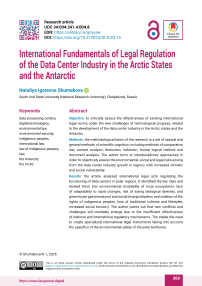International Fundamentals of Legal Regulation of the Data Center Industry in the Arctic States and the Antarctic
Автор: Shumakova N. I.
Журнал: Journal of Digital Technologies and Law @lawjournal-digital
Статья в выпуске: 3 (3), 2025 года.
Бесплатный доступ
Objective: to critically assess the effectiveness of existing international legal norms under the new challenges of technological progress, related to the development of the data center industry in the Arctic states and the Antarctic. Methods: the methodological basis of the research is a set of special and general methods of scientific cognition, including methods of comparative law, content analysis, deduction, induction, formal logical method and document analysis. The author turns to interdisciplinary approaches in order to objectively assess the environmental, social and legal risks arising from the data center industry growth in regions with increased climatic and social vulnerability. Results: the article analyzed international legal acts regulating the functioning of data centers in polar regions. It identified the key risks and divided them into environmental (instability of local ecosystems, lack of adaptability to rapid changes, risk of losing biological diversity, and greenhouse gas emissions) and social (marginalization and violation of the rights of indigenous peoples, loss of traditional cultures and lifestyles, increased social tension). The author points out that new conflicts and challenges will inevitably emerge due to the insufficient effectiveness of national and international regulatory mechanisms. The states the need to create specialized international legal instruments taking into account the specifics of the environmental safety of the polar territories. Scientific novelty: for the first time, the article provides a comprehensive analysis of the integral risks and drawbacks of the current international legislation on data center industry in the Arctic states and the Antarctic. The author provides a comparative analysis of the normative framework and shows the inconsistency between the “soft law” principles application on the polar regions and the fourth technological revolution. The author substantiates the requirement to create new certification and reporting procedures throughout the lifecycle of data centers, taking into account the legal and cultural context. Practical significance: the results are focused on improving international and national policies in the sphere of regulating the data center industry and on developing certification and reporting standards that could be effective in the climatic, social and economic conditions of the Arctic states and the Antarctic. The research is aimed at minimizing the negative impact of anthropogenic factors and ensuring a balance between industrial development and the preservation of unique natural and cultural landscapes.
Data processing centers, digital technologies, environmental law, environmental security, indigenous peoples, international law, law of indigenous peoples, law, the Antarctic, the Arctic
Короткий адрес: https://sciup.org/14134122
IDR: 14134122 | УДК: 34:004:341.4:004.8 | DOI: 10.21202/jdtl.2025.15


